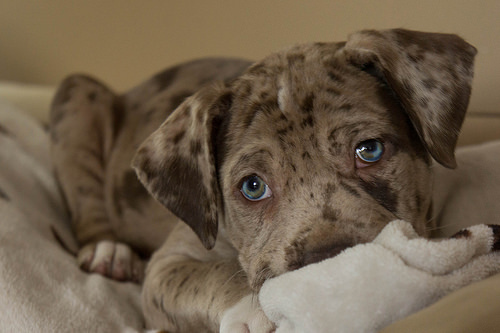You want a well-mannered dog. Really you do. But you worry that dog training will hurt the loving bond you share. Even the act of securing a leash and forcing your dog to walk in step feels cruel and restrictive. Dog training is okay for dogs but not for your baby.
Now, however, your precious baby has a few bad habits - like shredding the couch when you leave, barking every time someone walks by, or jumping on visitors. What started as amusing has become annoying.
You know you need to get a handle on it, but you're still in limbo, unwilling to shock, jab or jerk your baby into submission. Is there a happier approach to living with dogs that doesn't involve prolonged isolation, negative reinforcement or shock collars? And if there is, are you too late?
Yes there is, and no you're not too late. All across America, Dog Mommies (and Daddies) are speaking out in record numbers against the Top Dog Model of dog training. They're part of a growing majority --now 81% of dog owners - polled, call their dog family and, like you, want to live in harmony with their dogs.
In my summer blog series, I'll focus on a revolutionary new way to live with dogs that reflects these positive parenting trends. Taking a fresh approach to old topics - like separation anxiety, destruction and leash aggression - each piece will include games, learning activities and input from leading veterinarians and scientists like Brian Hare, Stanley Coren and Nicholas Dodman to reveal what you already know--that your dog can think, feel, and love.
For today, embrace your inner Dog Mommy or Daddy as you read over the 7 reasons you should never stop calling your dog your baby:
1) Dogs depend on loving attachments. Only dogs will willingly leave their own species to bond with people. As early as 7 weeks old, dogs prefer bonding to a person over another dog, when given the choice.
2) Dogs follow social cues, like pointing or staring. Only humans can do that! In experiments with apes, wolves, dogs and babies, only dogs and babies were able to track social cues directing them to a prize or food source.
3) Dogs have internal clocks.Like children, dogs have basic needs and thrive on routines. They do best with a schedule for feeding, play, rest and potty trips. While babies cry when their needs aren't met, dogs nip and get restless. Help your dog identify and satisfy his needs, and watch as he communicates with you by prompting these everyday routines.
4) Dogs mirror our emotions and show empathy. Dogs--like kids-- can identify our moods and reflect our emotions. They are more relaxed when we are calm, so take it down a notch. Research has also shown that dogs show empathy even when a stranger is crying.
5) Dogs learn faster and more reliably through positive reinforcement. Dogs repeat the behaviors that earn attention. But remember: negative attention - like pushing or chasing (which can seem like confrontational play to a dog) - can encourage bad habits.
6) Dogs use trial and error to establish new behaviors. Dogs are opportunists. They like what they like and focus their attention on getting more - more food, more toys, more attention. Using trial and error, dogs will repeat anything that works. We all know the throw-my-tennis-ball stare, the jangling car keys leap and the rub-my-ears nudge. These areall behaviors established through trial and error.
7) Dogs avoid anything too scary. Fear is a natural response to things that are unfamiliar. Some dogs are more sensitive to change than others, but all puppies benefit from early socialization. Expose your puppy to new experiences -- safely walk past playgrounds and construction sites, and gently introduce her to the vacuum cleaner and the garbage truck. And don't forget points 4 and 5 -- if you appear afraid or reinforce the fear by coddling your puppy won't gain confidence.
As an applied behaviorist, trainer and mommy of a multi-species household, I've long witnessed the similarities between dogs and children and followed as science researched and approved the dog-like-child parenting analogy. Now history, researchers and dog lovers everywhere support the intense love and striking emotional similarities between us. The time is now to treat these sensitive, intelligent creatures more like children. Kids--and dogs--raised with kindness and respect grow up happy. And happy is good.
As we continue to explore this topic, I'll be gathering insights for my new book, "Parenting Your Dog," St. Martin's Press, to be released Fall 2016. Connect with me here and on my social media channels, and share the many ways that your fur baby has touched your heart.
